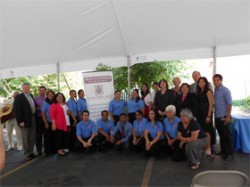By: Celia Martinez
 Changing a behavior cannot be accomplished overnight. Whether individuals want to change their eating habits or begin exercising daily, it takes a lot of time and effort to implement it as a lifestyle. But for people living with type 2 diabetes, not changing certain behaviors can become life threatening. That’s why Alivio Medical Center with its Compañeros en Salud team has partnered up with the American Academy of Family Physicians Foundation and its Peers for Progress program to do just that, change behavior. The 36-month project is aimed to improve the health outcomes of Latino Chicagoans living with type 2 diabetes.
Changing a behavior cannot be accomplished overnight. Whether individuals want to change their eating habits or begin exercising daily, it takes a lot of time and effort to implement it as a lifestyle. But for people living with type 2 diabetes, not changing certain behaviors can become life threatening. That’s why Alivio Medical Center with its Compañeros en Salud team has partnered up with the American Academy of Family Physicians Foundation and its Peers for Progress program to do just that, change behavior. The 36-month project is aimed to improve the health outcomes of Latino Chicagoans living with type 2 diabetes.
Made possible by a grant from the Bristol-Myers Squibb Foundation as part of its Together on Diabetes program, and in collaboration with TransforMED and National Council of La Raza (NCLR) the project which began August 1st, has paired 400 Alivio patients living with type 2 Diabetes with peers and will follow their progress for a two year implementation period in an effort to change the patient’s behavior. “It’s a big challenge for Alivio because changing behavior is not easy,” said Carmen Velasquez, executive director of Alivio Medical Center. “It is hard to break bad habits.”
Despite this, Alivio and Compañeros en Salud have strategically partnered these patients with peers of similar backgrounds in hopes of ultimately getting them to better self manage their diabetes.
“When you pair patients who have a chronic illness, in this case diabetes, with someone they can relate to: that looks like them, talks like them, shares the same type of history whether its immigration to this country- they build a stronger relationship,” said Juana Ballesteros, Mi Salud project manager for Alivio Medical Center. “So that patient is a lot more reciprocal and open about what they have to say and therefore they are more willing to take that advice and recommendations because they trust what this person is telling them.”
According to Velasquez, Alivio was chosen because of their experience in their line of work, their commitment to Compañeros en Salud and their commitment to the concept of neighborhood people having value and helping their peers to take care of themselves. “We don’t empower anybody,” said Velasquez. “When you decided that you want to control your diabetes, you need to change your behavior. No one can do that for you.”
The Peers for Progress program will not just allow for medical professionals to track changes in behavior but also to see how peer-support affects their decisions and offer health and nutrition advice to help patients make healthier choices.
“Were not going into this being naïve either,” said Ballesteros, “we understand that out patients have so many other pressing issues, we definitely want to help our patients figure out what their own individual barriers are and minimize them.”
Velasquez said there are nearly 4,000 Alivio patients living with diabetes and she along with Ballesteros understand that people living with diabetes live with it 24 hours a day, seven days a week and when patients leave a clinic they face a vast array of issues that can’t be tackled with a ten minute visit with a medical provider. However, they remain optimistic in the project and the mission.
“I feel confident that we can prove in two years that our patients when they receive this type of service of peer support it will actually show that they are managing their glucose and monitoring it at home,” Ballesteros said. “We are moving towards a new model of healthcare delivery in this country,” she added.










